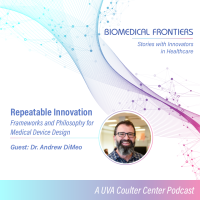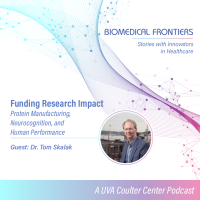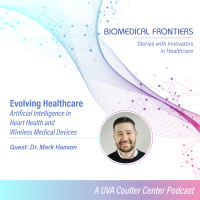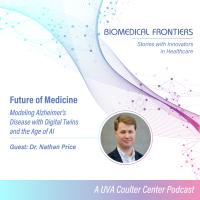Biomedical Frontiers: Stories with Innovators in Healthcare

Biomedical Frontiers is a forum for in-depth discussions at the intersection of healthcare technology and translational research. We feature leading voices from the University of Virginia community and the broader biomedical industry. Each episode explores pivotal research projects and disruptive innovations aimed at translating scientific advancements into tangible healthcare solutions. Rooted in the Coulter Center's mission, this podcast seeks to dissect the methodologies and implications of explicitly translational research, examining their potential to reshape medical practice and patient outcomes.
Join us on this intellectual voyage, where we unravel the complexity of biomedical innovation, fostering a deeper understanding of its impact on healthcare and the broader scientific community. Notable guests of the podcast include Dr. Nathan Price, Chief Science Officer of Thorne Health and co-author of The Age of Scientific Wellness: Why the Future of Medicine is Personalized, Predictive, Data Rich and in Your Hands, Dr. Natasha Sheybani, a pioneering researcher in Focused Ultrasound Immunotherapy and the winner of Forbes 30 under 30 in Science, and Dean Jennifer West, University of Virginia’s Dean of the School of Engineering and Member of the National Academy of Engineering, National Academy of Medicine and National Academy of Inventors.
Biomedical Frontiers: Season Three Episodes
Genetic Disorders of the Eye: Living with Vision Loss, Patient Advocacy, and Rare Disease Research
What is it like to live with a rare genetic eye disorder? Join Dr. Abigail Fahim and Dr. Chris Moen as they discuss choroideremia—a progressive retinal disease—and how research, advocacy, and patient experience intersect to push for treatments and improve quality of life.
Dr. Fahim shares her cutting-edge research into the cellular mechanisms driving this progressive condition, while Dr. Moen—a physician, patient, and advocate—shares his personal experience with vision loss and the systemic gaps that impact those with rare diseases.
Digital Mental Health: Future of Managing Anxiety and Depression with Dr. Bethany Teachman
How do we tackle the rising epidemic of anxiety with tools that actually scale? Why aren’t traditional therapy models enough? And how can digital technologies like mobile sensing and cognitive bias modification help close the treatment gap in mental health?
In this episode, Dr. Bethany Teachman, Professor of Psychology and Director of Clinical Training at the University of Virginia, explores how digital mental health tools are being designed and tested to meet people where they are.
Improving Rural Health: Medical Devices That Increase Health Access with Dr. Aileen Helsel
Can medical devices improve patient care in rural healthcare systems? In this episode, Dr. Aileen Helsel, Director of Innovation at Carilion Clinic, shares how her team of engineers works with Carilion’s clinical teams to develop new medical devices that solve unique challenges in rural settings.
Rural patients often travel long distances for care - making management of time-sensitive emergencies and recurring visits for chronic conditions particularly challenging. Dr. Helsel highlights three projects: a wearable lymphedema therapy device, an early detection system for ventriculoperitoneal shunt failures, and a cardiac surgery arm positioning device. Each of these devices was conceptualized at the bedside (or in the operating room) and brought to life with the expertise and passion of a physician.
Stories with Innovators in Healthcare: Stay Connected
Biomedical Frontiers: Season Two Episodes
Tech Transfer, navigating the healthcare system and taking risks, from academia to industry with David Chen and Lisa Bowers
How do groundbreaking biomedical innovations move from research labs to real-world applications? What challenges make healthcare such a complex industry for startups? And what risks are worth taking when translating science into impactful solutions?
In this episode of Biomedical Frontiers, host Dasha Tyshlek sits down with David Chen, Assistant Dean of Entrepreneurship and Innovation Partnerships, and Lisa Bowers, Director of UVA’s Enterprise Studio and former biotech executive, to explore tech transfer in healthcare.
Dr. Jonathon Hill on Gene Sequencing: How Epigenetics is Driving New Diagnostics and Disease Prevention
Dr. Jonathon Hill is an Associate Professor of Cell Biology and Physiology at Brigham Young University and the Vice President of Science & Technology at Wasatch BioLabs. In this episode of Biomedical Frontiers, we dive into the field of genetic sequencing and genomics, how Jonathon built a company from the foundation of a novel gene sequencing technique, his research into congenital heart defects, and the future of the epigenetics field.
He is a Fulbright Scholar and a BYU Early-Career Teaching Award recipient, having received his MS in Molecular Biology from the University of Colorado Health Science Center and a PhD in Genetics and Developmental Biology from Columbia University. His company Wasatch Biolabs is working to move epigenetics from the lab to the clinic and his lab at BYU researches the molecular genetics of congenital heart defects by studying the development of hearts in embryos.
Dr. Andrew DiMeo on Repeatable Innovation: frameworks and philosophy for medical device design
Dr. Andrew DiMeo is a health innovator, biomedical engineer, design philosopher, and social entrepreneur. He began his career in New York, working on movies and TV shows, most notably The Sopranos. He has a BS in Physics and PhD in Biomedical Engineering and has spent most of his career teaching and practicing health innovation. In this episode of Biomedical Frontiers, we dive into Dr. DiMeo’s time teaching biomedical entrepreneurship at UNC and NC State, the teaching methodology and the philosophy for creating successful translational research classes/programs, a new framework to help organizations innovate, and the future of STEM careers and education.
Dr. DiMeo has served as a Team Lead in NIH Programs, including RADx, ITAP, Blueprint MedTech, HIV Point of Care Testing, and C3i. He was previously a Professor of the Practice at UNC & NC State for 12 years where his students started multiple startups including 410 Medical, Contour Surgical, Augment Medical, Novocor Medical Systems, and MEDIC. He was co-founder of Gilero, founder of the NC Medical Device Trade Organization, and founder of CanvasGT, a SaaS startup acquired by Greenlight Guru.
Today, you can find him mentoring the next generation of social entrepreneurs, working on his new venture, Hangar Dreys - a co-working concept in Raleigh, NC focused on addressing the loneliness epidemic, or riding a bicycle somewhere in the woods.
Dr. Shayn Peirce-Cotter on How Diabetes and Alzheimer's Diseases Impacts the Smallest Blood Vessels
Dr. Shayn Peirce-Cottler is the Harrison Distinguished Teaching Professor and Chair of Biomedical Engineering, with secondary appointments in the Department of Ophthalmology and Department of Plastic Surgery at the University of Virginia (UVA). In this episode of Biomedical Frontiers, we dive into the history and future of microvascular research, the observed connection between Alzheimer's and diabetes, and the future healthcare applications of computational modeling.
Dr. Peirce-Cottler received a Bachelor of Science degree in Biomedical Engineering and Engineering Mechanics from Johns Hopkins University, and she earned her Ph.D. in the Department of Biomedical Engineering at the University of Virginia. She has published over 125 peer-reviewed papers and book chapters, is a fellow in both the American Institute for Medical and Biological Engineering College of Fellows (AIMBE) and the Biomedical Engineering Society (BMES). She was awarded the UVA School of Medicine’s Robert H. Kadner Award for Excellence in Graduate Teaching and Mentoring. Her courses in cell and molecular physiology and computational systems bioengineering are foundational to the BME undergraduate and graduate studies at UVA.
Dr. Tom Skalak on the Value of Research, Emerging Fields of Cognition and Human Performance, and the Art-Science Collaborations
Investment is critical for advancing promising biomedical research out of the lab and into the hospital. Dr. Tom Skalak has worked widely on innovation ecosystems with the White House, U.S. Congress, and Fortune 500 CEOs and C-suites seeking cultures to advance creative ideation and implementation of innovations. He urges VCs to invest locally with research universities and shares his perspective of some of the most exciting, emerging fields of research.
Tom Skalak joined the Joe and Clara Tsai Foundation in 2018 as Senior Advisor to Clara Wu Tsai and was previously the founding Executive Director of The Paul G. Allen Frontiers Group in Seattle, and Vice President for Research Emeritus at the University of Virginia. In these roles, Tom led creative synthesis of research and innovation programs spanning biosciences, environmental sustainability, physical sciences, engineering and technology, arts, design, entrepreneurship, and humanities. In this episode of Biomedical Frontiers, we dive into how small start-ups can grow and thrive in the competitive biomedical technology industry, innovative research in the discipline of protein design and the future applications, and the challenges in studying the emerging fields, human cognition and performance.
As Professor and Chair of Biomedical Engineering at UVAs, Tom’s original research included: cardiovascular biomechanics, computational modeling, wound repair, and regenerative medicine, conducted with continuous NIH funding over 28 years. He is a past president of both the American Institute of Medical and Biological Engineering (AIMBE) and the Biomedical Engineering Society (BMES). He was the founder of the UVA-Coulter Foundation Translational Research Partnership and early-stage investment funds with corporate partners such as Johnson & Johnson and AstraZeneca.
Biomedical Frontiers: Season One Episodes
Dr. Mark Hanson on the Evolution of Healthcare Delivery, AI in Heart Health and Wireless Medical Devices
Heart disease is the leading cause of death for men and women in the United States. Mark Hanson co-founded Heartbeat Health to make heart care more consistent and to ensure the patient gets the care when they need it, wherever they are. By transforming how heart care is delivered through technology, the Heartbeat Health team is accelerating access to quality cardiovascular care and improving patient outcomes. In this episode of Biomedical Frontiers, we explore how telemedicine can be a solution to improving quality of care while also reducing cost and dive into how the healthcare industry is changing as more and more providers and insurers are adopting a value based care approach.
Mark Hanson is a co-founder, advisor, and former Chief Product and AI Officer at Heartbeat Health, a venture-backed healthcare technology startup focused on delivering tech-enabled cardiovascular care at scale, nationwide. Before starting Heartbeat Health, Mark also founded BeClose, a digital health company that utilized IoT devices and AI-powered services to promote healthy independent living at home, which was merged into Alarm.com, where he served as the head of platforms and health innovations during their IPO. He is a long-time board member of the University of Virginia's School of Engineering and Applied Science Entrepreneurship Advisory Board, an Adjunct Associate Professor at The George Washington University School of Medicine and Health Sciences, and an angel investor and advisor to numerous health tech startups.
Dr. Jennifer West on the Future of Tissue Engineering and Novel Cancer Treatments
Tissue engineering is an exciting field that promises to solve many health conditions, but there are several fundamental challenges that remain unsolved. Dr. Jennifer West is leading the field with research on novel techniques that promote vascularization (tissue blood supply) and mimic the extracellular matrix (ECM) for tissue engineering applications. Dr. West’s lab focuses on biomaterials, nanotechnology, and tissue engineering, applying engineering approaches to study biological problems and address unmet medical needs.
Most recently, she is also a co-founder of Nanospectra Biosciences, a company commercializing a cancer therapy using gold nanoparticles for photothermal therapy. This unique, non-invasive technique is currently in human clinical trials. She is a uniquely prolific inventor, a fellow of the National Academy of Inventors and has over 19 patents that have been licensed to eight different companies and across multiple engineering disciplines.
As the Dean of the Engineering School at University of Virginia Dr. West is guiding the trajectory of instruction, research and entrepreneurship at the University. She has promoted collaboration between engineering and medicine, expanded the biomedical engineering faculty and fostered numerous cross-school research collaborations with over $23 million in external funding. In this episode of Biomedical Frontiers: Stories with Innovators in Healthcare, she shares her vision for engineering at UVA.
Dr. Daniero and Dr. Griffin on Regenerating Vocal Cords and Airways with Novel Biomaterials
In this episode of Biomedical Frontiers, we learn about how biomaterials are engineered for tissue scaffolding in unique environments within our bodies and how these entrepreneurial professors are solving challenges inside and outside the research lab. Dr. Griffin and Dr. Daniero are exploring applications of biomaterial scaffolds for applications in cleft palate and intubation injuries, providing scaffolds for the patient’s own tissue to regrow naturally and permanently.
Dr. Slivia Blemker on Modeling Muscles with MRI and AI for Personalized Musculoskeletal Healthcare
In the latest installment of Biomedical Frontiers: Stories with Innovators in Healthcare, Dr. Blemker takes us on a journey through the evolution of Biomedical Engineering as a discipline. She shares her approach to leveraging AI to accelerate the pace of developing Springboks Analytics technologies for more applications. Dr. Blemker also introduces us to one of her groundbreaking projects, funded by the NIH, aimed at developing precise, sex-specific musculature models. This project promises to equip future researchers with robust tools for studying women's muscle systems with unparalleled accuracy, ensuring that gender disparities in medical research are addressed head-on.
Dr. Natasha Sheybani on Precision Cancer Treatments with Immunotherapy and Focused Ultrasound
An in-depth discussion with Dr. Natasha Sheybani, who is pioneering the use of Focused Ultrasound (FUS) in precision cancer treatment at the University of Virginia. Dr. Sheybani's research focuses on enhancing immunotherapy for brain and breast cancers through innovative, non-invasive techniques. Her efforts to improve glioblastoma patient outcomes by overcoming major treatment barriers, such as the blood-brain barrier, have earned her recognition by the Forbes 30 under 30 in Science Award and many others. This episode delves into the promising future of cancer care, highlighting the collaborative efforts and clinical trials underway at UVA that are bringing us closer to more effective, personalized cancer treatments.
Dr. Nathan Price on Alzheimers, Digital Twins, and the Future of Medicine in the Age of AI
In this episode, we delve into the future of medicine with Dr. Nathan Price, Chief Science Officer at Thorne HealthTech and co-author of "The Age of Scientific Wellness." Dr. Price shares his visionary insights on transforming medicine through systems biology approaches, modeling and analytics, and practices centered on prevention. He shares how his research uses digital twins in predicting and preventing the progression of Alzheimer’s disease and how other AI developments are impacting access to diagnosis and treatments.
Dr. Nathan Price highlights the transformative power of combining phenotyping and genotyping in research, allowing for a deeper understanding of disease progression and potential interventions long before symptoms appear. “You can look for what's different in individuals 20 years before the disease would be expected to emerge. What you find is that differences manifest in the blood in these dense data clouds. This longitudinal data is different as a function of differential risk for that disease.”
Biomedical Frontiers Production:
Director & Host: Dasha Tyshlek, StratCraft, Inc. www.strat-craft.com
Executive Producer: David Chen, Managing Director & Instructor of Engineering Design, UVA
Senior Producer: Hannah Moore, Associate Director, UVA Coulter
Design Director: Carolyn Wagner, Inc. & Link: carolynwagnerinc.com
Produced on behalf of the Wallace H. Coulter Center for Translational Research at UVA













